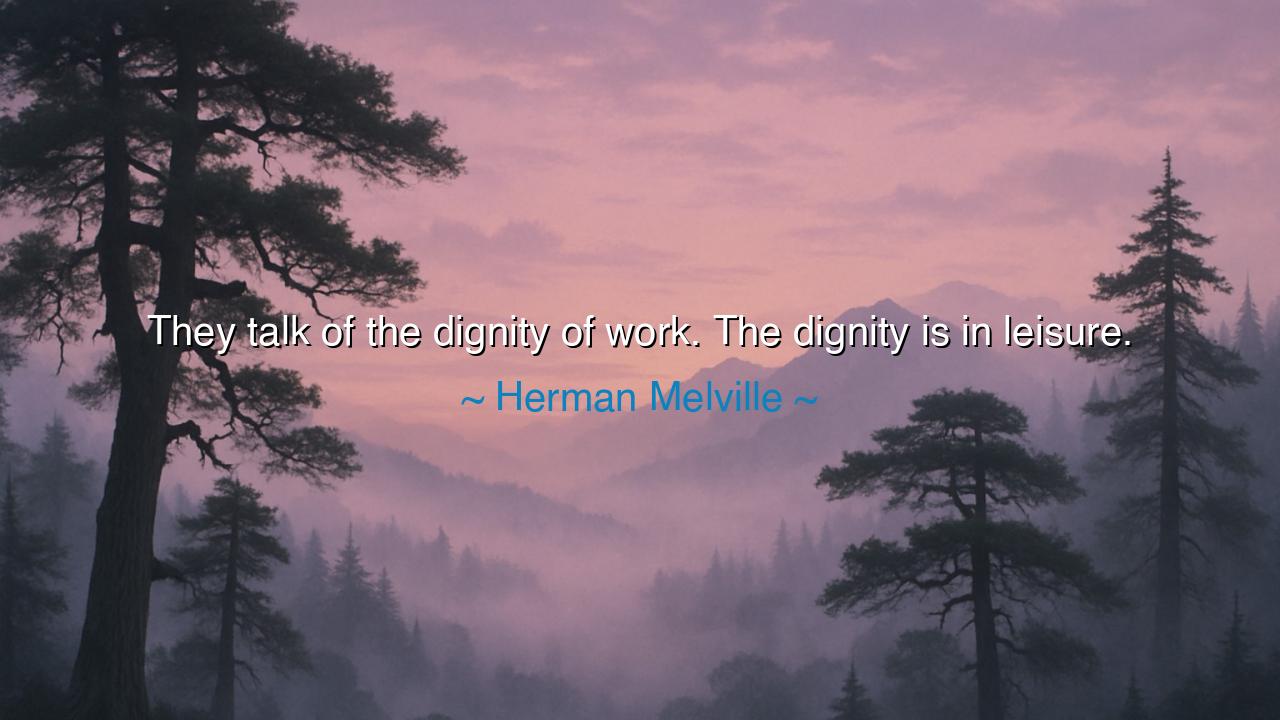
They talk of the dignity of work. The dignity is in leisure.






Hearken, O children of the ages, to the words of Herman Melville, who speaks with the voice of reflection and subtle defiance: “They talk of the dignity of work. The dignity is in leisure.” Here lies a teaching both paradoxical and profound: that the true honor of life is not found in toil alone, but in the sacred space where the spirit may rest, contemplate, and awaken. Work may sustain the body, but it is in leisure that the soul discovers its freedom, its creativity, and its capacity for wisdom.
In the chronicles of old, the elders observed that humanity often mistakes busyness for virtue. The laborer may boast of endurance, yet the truly dignified life is measured not by the quantity of work, but by the depth of reflection, contemplation, and the art of being fully present in the stillness. Melville reminds us that leisure is not idleness, but a sacred vessel in which thought, beauty, and insight are nurtured, and where the soul communes with the eternal.
The origin of this wisdom is ancient, found in the teachings of philosophers, sages, and poets who extolled the virtues of contemplation over mere labor. Across gardens, temples, and academies, it was understood that work maintains the body, but leisure nourishes the spirit. Only when the heart is freed from the unceasing demands of toil can it perceive truth, cultivate virtue, and taste the fullness of life. Melville, in his modern voice, carries this timeless counsel, challenging the world to honor the sacred pause.
O seekers, understand that the art of life requires both labor and pause. To work without leisure is to drain the soul; to rest without purpose is to squander the gift of stillness. The true dignity arises when one balances action with reflection, exertion with contemplation, and worldly endeavor with sacred repose. It is in this harmony that life attains its deepest meaning, and the spirit grows luminous.
Let this teaching endure, children of the future: treasure the moments of leisure as the cradle of wisdom, the source of joy, and the space in which the soul may breathe and flourish. While work sustains existence, leisure elevates it, revealing the eternal truth that dignity is not measured by effort alone, but by the grace and awareness cultivated in the sacred stillness between acts.
If you wish, I can also craft a more poetic, ceremonial version, where leisure is depicted as a sacred temple in which the spirit finds its dignity. Would you like me to do that?






VTNguyen Van Trong
It’s refreshing to read a perspective like Melville’s, especially in a world where hustle culture is so dominant. What if we spent more time valuing our personal lives, hobbies, and moments of rest, rather than constantly chasing achievements at work? Could embracing leisure lead to a richer, more meaningful life?
NTNguyen Tung
I find myself wondering if leisure has been underrated in our culture. We often see work as the cornerstone of personal dignity and fulfillment, but what happens when we take time to relax, explore, and simply be? Melville seems to be suggesting that true dignity comes from a balance between action and rest. Can we truly be fulfilled without allowing for both?
LLLun Long
This quote brings up an important question about balance in life. Do we value leisure enough in our society, or do we constantly measure worth by how much we’re accomplishing? If dignity is truly found in leisure, maybe we need to redefine success, prioritizing rest, personal growth, and reflection rather than just striving for more tasks and achievements.
DNDuong Nhan
Melville’s perspective really challenges the conventional view of work. It’s almost like he’s saying that without the time and space to rest, appreciate, and reflect, work loses its true meaning. But is it possible to have dignity without work at all? Can leisure truly provide the same sense of purpose and value that work supposedly offers?
TQDuong thanh quang
I find it interesting how Herman Melville flips the common idea of work being the source of dignity. We’re often told that hard work defines us and gives us purpose, but could it be that true dignity comes from the freedom and fulfillment we find in leisure? It makes me think—are we too focused on productivity and not enough on simply enjoying life?